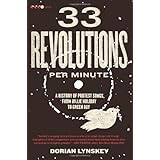
Average Reviews:

(More customer reviews)We've all heard ad nauseam how the only people to actually get anything done in this country were the baby boomers in the 1960's, with protest against the Vietnam War, marching for Civil Rights, put out music and movies that were culturally relevant, and so on. Conversely, there are those who thought, and still think, the 60's were a time when America lost its moral compass, politically and culturally, and are trying to change things back when it was a "better" place. "33 Revolutions per Minute", by Dorian Lynskey, which covers the protest song from Billie Holliday's "Strange Fruit" to Green Day's "American Idiot", may not change anyone's mind on what protest songs, and movements, meant to this country (as well as Britain, Chile, and Africa), but it's a well-written history.
As the title would suggest, Lynskey, a music critic for the Guardian, picks 33 songs to write about. Along with the two listed above, it includes songs both well-known (Woody Guthrie's "This Land is Your Land", Bob Dylan's "Masters of War", James Brown's "I'm Black and I'm Proud", Crosby, Stills, Nash & Young's "Ohio", Frankie Goes to Hollywood's "Two Tribes", which apparently got Lynskey interested in protest music) and lesser known (Nina Simone's "Mississippi Goddamn", the music of Victor Jara, a singer/protestor in Chile until he was murdered when Pinochet took over, Steve Earle's "John Walker Blues"). Instead of merely describing the songs, however, Lynskey describes the history behind the songs (a brief description not only of the singer or band at the time, as well as what was going on in that particular country at the time), and often even a parallel songwriter whose work either complemented or contrasted the song under discussion (such as dealing with Phil Ochs in the chapter on Bob Dylan, as Ochs was more obviously political, and discussing the Clash and Sex Pistols, as while they both were the leaders of British punk they were also diametrically opposed in many ways).
While Lynksey isn't blind to the pretensions that go with the territory when it comes to writing protest songs (he singles out John Lennon as a case in point, though I do think he's a tad harsh when it comes to "Revolution"; its ambivalence is why, I think, it's still potent as a song), and he also recognizes how many singers were unable or unwilling to keep up the momentum (Dylan, for one, famously backed off from making any explicit protest songs when he went electric), he also isn't out to mock. He genuinely appreciates the intent behind many of the songs, and how they went hand in hand with the political movements of the time (though he concentrates more on civil rights than, say, feminism). While he concentrates mostly on the U.S. and Britain, Lynskey does touch on how protest music fermented in Latin America and Africa (as well as recognize how, unlike here and in Britain, singing these songs could get you killed, and did). At the end, Lynskey wonders if, as well as writing a history, he's also written an epitaph for the protest song. That may well be true (as he also points out earlier, there were in fact a number of songs eventually protesting the war in Iraq, but they seemed independent of each other rather than unifying or galvanizing a protest movement), but a few nit-picks aside (he misses how the segregation of American radio affected African-American protest music), Lynskey has written a fitting tribute to the protest song, as well as a vital history of it.
Click Here to see more reviews about: 33 Revolutions per Minute: A History of Protest Songs, from Billie Holiday to Green Day

0 comments:
Post a Comment